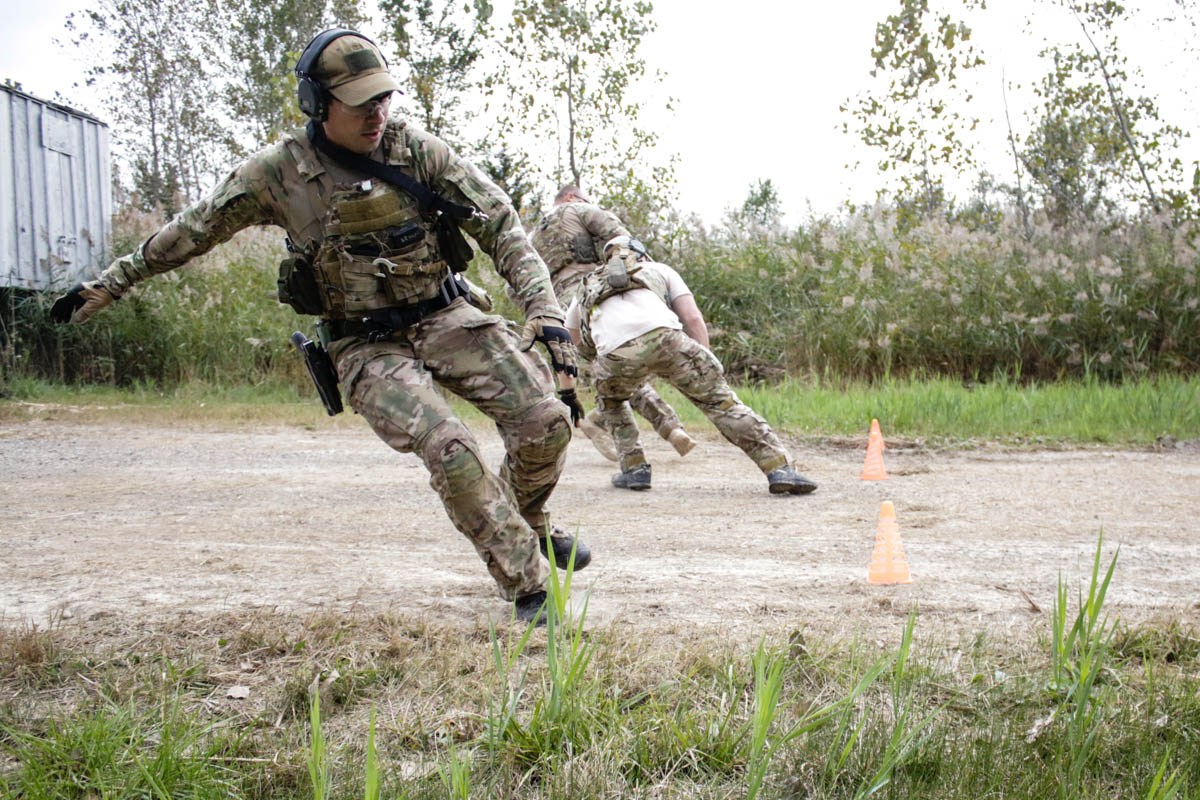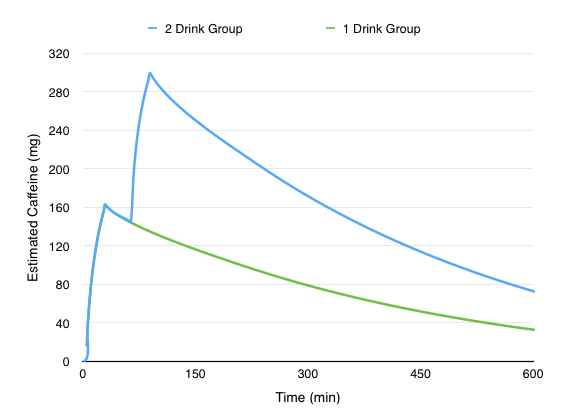In October 2015, researchers from Mountain Tactical Institute (MTI) were in the Midwest to work with a full-time, state-wide law enforcement tactical unit on two marksmanship studies:
1. Examining the effects of stress, as applied through a single Range Fitness Drill, on marksmanship performance.
2. Examining the effects of energy drink consumption on stressed and non-stressed marksmanship performance.
The Mini-Study included detailed information concerning subjects, methods, data, and discussion. Here is what we found from the initial results.
STUDY 1: Non-Stressed vs. Stressed Marksmanship
For this study athletes completed two types of marksmanship drills: Non-Stressed and Stressed.
1. The Non-Stress drill required athletes to assume a kneeling position and fire 5 rounds (5.56mm) at a 10-inch metal target at 80 yards distance – the drill was not timed. Athletes completed 12 trials for a total of 60 rounds. We recorded the number of hits and two heart rate measures (HR average and HR max) during each trial.
2. The Stress drill required athletes to complete 2x 15yard shuttle runs, retrieve their weapon, assume a kneeling position and fire 5 rounds at a 10-inch metal target at 80 yards distance. Athletes completed 12 trials for a total of 60 rounds. The entire drill had to be completed in under 20 seconds. We recorded the number of hits and two heart rate measures (HR average and HR max) during each trial.
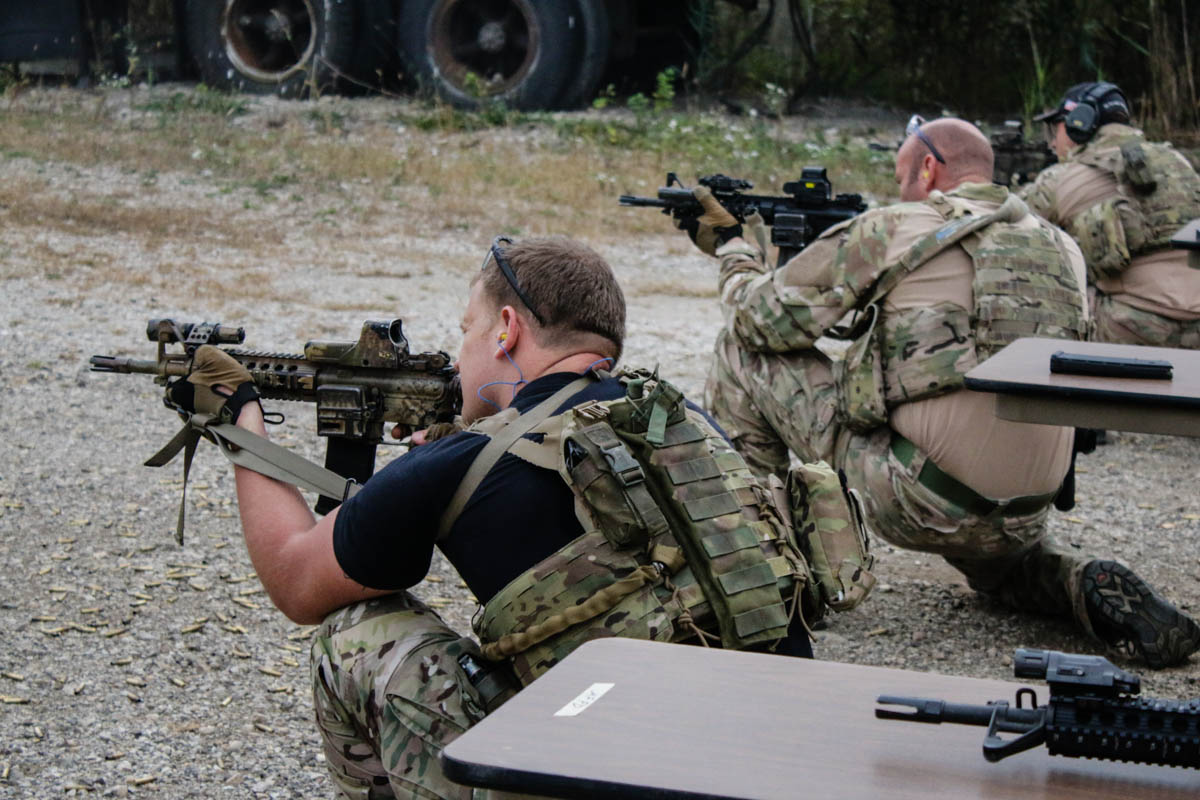
As expected, our stressed marksmanship drill resulted in a large, significant decrease in shooting performance. The stress drill also resulted in a large, significant increase in both heart rate measures (HRavg and HRmax).
Non-Stressed and Stressed Average Performance (Hits)
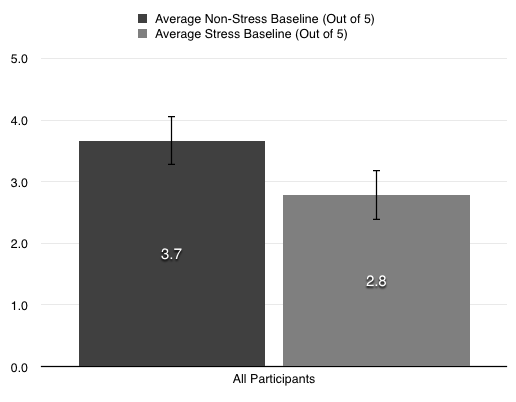
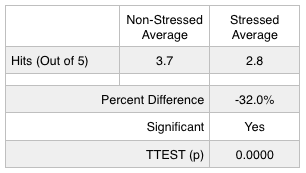

However, despite the significant changes in shooting performance and heart rate, neither heart rate measures (HRavg and HRmax) were significantly correlated to changes in shooting performance (using Pearson product-moment correlation coefficient – r).
STUDY 2: The Effects of Energy Drink Consumption on Non-Stressed vs. Stressed Marksmanship
For this study, the athletes were randomly assigned to one of three treatment groups. All athletes were blind to their treatment:
1. 2 doses of a common 16oz energy drink.
2. 1 dose of the 16oz energy drink and 1 dose of a 16oz placebo.
3. 2 doses of a 16oz placebo.
The first treatment was administered prior to the start of the second study. After five minutes the athletes began the first of eight rounds of non-stressed and stressed shooting. After 60 minutes all athletes received their second treatment. Again, immediately following a five minutes wait, all groups completed eight rounds of non-stressed and stressed shooting intervals.
Using previous research we were able to model and estimate caffeine absorption for each athlete. Then, we compared the three groups to identify any significant differences between marksmanship performance.
The charts below show the interaction of caffeine (bar graphs) with time and shooting performance (plots and trend lines). As you can see, some groups were more consistent than others. However, despite the inter-group variation, we were still able to find a few statistically significant differences.
During our non-stressed drills (first chart) two of the three groups (double energy drink and no energy drink) showed decreases in performance during the 2-hour experiment. However, during our stressed drills (second chart) all three groups showed improvements over the 2 hours.
Non-Stressed – All Groups: Caffeine, Time and Marksmanship (Hits per 5 rounds)
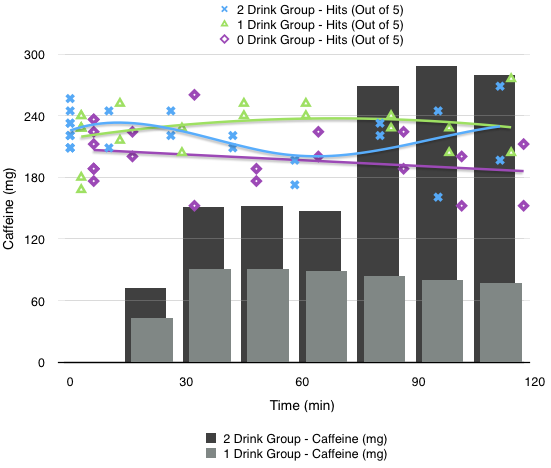
Stressed – All Groups: Caffeine, Time and Marksmanship (Hits per 5 rounds)
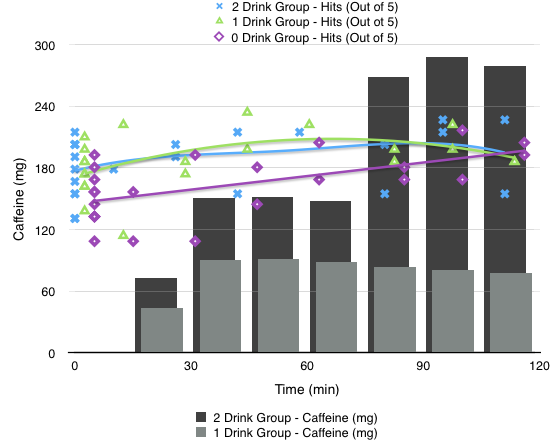
When this article was written, we were still in the process of crunching the numbers. All of these findings are captured in the full report (see link below).
References:
- U.S. Army (1989). M16A1 and M16A2 Rifle Marksmanship (FM 23-9). Fort Benning, GA: Author.
- U.S. Marine Corps. (2008). Rifle marksmanship REVISED (MCRP 3-01A). Albany, GA: Author.
- Burke, L.M., Caffeine and sports performance. Appl Physiol Nutr Metab, 2008. 33(6): p. 1319-34.
- Pallares, J.G., et al., Neuromuscular responses to incremental caffeine doses: performance and side effects. Med Sci Sports Exerc, 2013. 45(11): p. 2184-92.
- Mora-Rodriguez, R., et al., Caffeine ingestion reverses the circadian rhythm effects on neuromuscular performance in highly resistance-trained men. PLoS One, 2012. 7(4): p. e33807.
- Goldstein, E., et al., Caffeine enhances upper body strength in resistance-trained women. J Int Soc Sports Nutr, 2010. 7: p. 18.
- Lieberman, H.R. The effects of ginseng, ephedrine, and caffeine on cognitive performance, mood and energy. Nutr Rev. 2001; Apr;59(4):91–102.
- Bonnet, M.H., Balkin, T.J., Dinges, D.F., Roehrs, T., Rogers, N.L., Wesensten, N.J. The use of stimulants to modify performance during sleep loss: A review by the Sleep Deprivation and Stimulant Task Force of the American Academy of Sleep Medicine. Sleep. 2005; Sep 1;28(9):1163-1187.
- Committee on Military Nutrition Research Food and Nutrition Board. Institute of Medicine. Caffeine for the Sustainment of Mental Task Performance: Formulations for Military Operations ( 2001). National Academy Press, 2101 Constitution Avenue, NW, Washington, DC 20418
- Tharion, W.j., et al., The Use of Caffeine to Enhance Cognitive Performance, Reaction, Time, Vigilance, Rifle Marksmanship and Mood States in Sleep-Deprived Navy SEAL (BUD/S) Trainees. Military Nutrition and Biochemistry Division U.S. Army Research Institute of Environmental Medicine. 1997.
- McLellan, T.M., et al., The Effectiveness of Caffeine to Maintain Physical and Cognitive Function during Continuous Operations. DRDC Toronto, Walter Reed Army Institute of Research and New Zealand Defense Force. 2003.
- Johnson, R.F. and Merullo, D.J., Friend-Foe Discrimination, Caffeine, and Sentry Duty. U.S. Army Research Institute of Environmental Medicine, Natick, Massachusetts. Proceedings of the Human Factors and Ergonomics Society 43rd Annual Meeting. 1999.
- Committee on Military Nutrition Research Food and Nutrition Board. Institute of Medicine. Caffeine for the Sustainment of Mental Task Performance: Formulations for Military Operations ( 2001). National Academy Press, 2101 Constitution Avenue, NW, Washington, DC 20418
Full Report: Energy Drinks Can Help Maintain Marksmanship Performance
